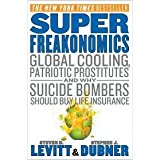No, this is not a joke, as one of my friends surmised. A banker in England realized the best way to fight terrorism is to identify likely terror suspects before they can strike. He began to identify all the characteristics and behaviors of a terrorist from his bank’s database, like they tended to make one large deposit, then withdraw money in small amounts over time, and they didn’t use savings accounts or safe-deposit boxes. And he discovered one of those characteristics is they never purchase life insurance. By the way, the resulting algorithm worked very well, identifying thirty highly suspicious people.
Such are the wa ys of behavioral economics, as related in SuperFreakonomics by Steven D. Levitt and Stephen J. Dubner. Originally published in 2009 as a follow-on to their bestselling Freakonomics, it is still available today.
ys of behavioral economics, as related in SuperFreakonomics by Steven D. Levitt and Stephen J. Dubner. Originally published in 2009 as a follow-on to their bestselling Freakonomics, it is still available today.
In case you’re not familiar with the term, behavioral economics uses psychological insights into human behavior to explain economic decision-making. It’s through behavioral economics that we’ve realized people don’t always act in rational or predictable ways. For example, the Endangered Species Act can actually endanger species. As a result, it’s wise to never take anything for granted, like car seats being the best way to protect older children, or if you’ve had too much to drink, it’s better to walk home rather than drive (it isn’t — the death rate for walking drunk is actually higher). And the discussion on climate change is a real eye-opener!
So if you have an open mind on how the world really works, this is a very worthwhile read.
